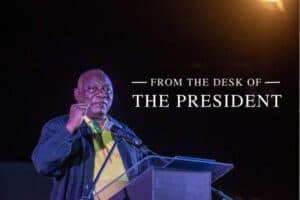The commission will report on alleged police and legal collusion from 2003 to present.

President Cyril Ramaphosa has appointed retired Constitutional Court Judge Sisi Khampepe to chair a judicial commission of inquiry to determine whether attempts were made to prevent the investigation and prosecution of apartheid-era crimes.
Khampepe will be assisted by retired Northern Cape Judge President Frans Diale Kgomo and Advocate Andrea Gabriel.
The president signed a proclamation for the establishment of a judicial commission on Thursday.
Commission of inquiry
Ramaphosa said the establishment of the commission of inquiry is part of an agreement reached in settlement discussions in a court application brought by families of victims of apartheid-era crimes.
“For many years, there have been allegations of interference in these cases. This alleged interference is seen as the cause of an unacceptable delay in the investigation and prosecution of brutal crimes committed under apartheid. This has caused the families of victims great anguish and frustration.
ALSO READ: Apartheid-era cops plead not guilty to 1987 murder of Caiphus Nyoka
“All affected families – and indeed all South Africans – deserve closure and justice. A commission of inquiry with broad and comprehensive terms of reference is an opportunity to establish the truth and provide guidance on any further action that needs to be taken,” Ramaphosa said.
Terms
Ramaphosa said the commission must inquire into, make findings, report on and make recommendations on:
- Whether, why, to what extent and by whom attempts were made to influence members of the South African Police Service or National Prosecuting Authority not to investigate or prosecute cases identified by the Truth and Reconciliation Commission;
- whether any members of the Saps or the NPA improperly colluded with such attempts to influence or pressure them;
- whether any action should be taken by an Organ of State, including possible further investigations or prosecutions, of persons who may have acted unlawfully;
- Whether the payment of any amount in constitutional damages to any person is appropriate;
The commission will cover the period from 2003 to the present and is expected to complete its work within six months from the date of Ramaphosa’s proclamation, submitting its report within 60 days after completing its work.
Enquiries
Ramaphosa’s spokesperson, Vincent Magwenaya, said that while the families of victims and the government have agreed to the establishment of the Commission of Inquiry, they were unable to reach a settlement on other matters in the application.
“The government believes that these matters will be addressed through the commission of inquiry, while the families want the matters to be determined by a court”.
Magwenya said Ramaphosa respects the decision of the families to seek a court order to address the violation of their rights and seek constitutional damages through the courts.
Stay of application
However, the government was seeking a stay of application on these outstanding matters pending the conclusion and outcomes of the commission of inquiry.
“As the commission undertakes this important task, we welcome the firm commitment by the NPA and the South African Police Service to investigate and, where appropriate, to prosecute the outstanding TRC cases. In recent years, the NPA has reopened and pursued priority cases. It has assigned dedicated resources to ensure these cases are dealt with effectively.
“As this government, we are determined that those individuals responsible for apartheid crimes and who were not granted amnesty by the TRC be held to account,” Magwenya said.
SA history
Ramaphosa added that the commission of inquiry is an opportunity to draw a line under a painful period in the country’s history.
“It is an opportunity to establish the truth and take steps, to the extent possible, to put right what may have gone wrong.
“I thank the Commission chairperson and two assistants for agreeing to take on this responsibility and wish them well in their work,“ Ramaphosa said.
Khampepe
This is not the first time that Khampepe has chaired a commission of inquiry.
Between 2005 and 2006, she chaired a Commission of Inquiry into the mandate and location of the Directorate of Special Operations (Scorpions), which became known as the Khampepe Commission.
In June 2023, Khampepe chaired the commission of inquiry, which aimed to address the issues faced by people living in hijacked buildings in the Johannesburg CBD.
The former Constitutional Court justice was also known for sending former president Jacob Zuma to prison after he failed to appear before the Zondo commission.
Khampepe’s ruling caused unrest in the country, where businesses were looted and malls were vandalised, leaving over 300 people dead.
ALSO READ: Conviction of apartheid cop John Marais for killing of Caiphus Nyoka lauded
Support Local Journalism
Add The Citizen as a Preferred Source on Google and follow us on Google News to see more of our trusted reporting in Google News and Top Stories.








